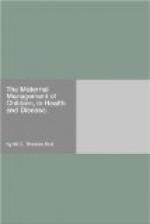Sect. II. Weaning.
The time when to take place.—The time when weaning is to take place must ever depend upon a variety of circumstances, which will regulate this matter, independently of any general rule that might be laid down. The mother’s health may, in one case, oblige her to resort to weaning before the sixth month, and, in another instance, the delicacy of the infant’s health, to delay it beyond the twelfth. Nevertheless, as a general rule, both child and parent being in good health, weaning ought never to take place earlier than the ninth (the most usual date), and never delayed beyond the twelfth month.
I should say further, that if child and parent are both in vigorous health, if the infant has cut several of its teeth, and been already accustomed to be partially fed, weaning ought to be gradually accomplished at the ninth month. On the other hand, that if the child is feeble in constitution, the teeth late in appearing, and the mother is healthy, and has a sufficient supply of good milk, especially if it be the autumnal season, it will be far better to prolong the nursing for a few months. In such a case, the fact of the on-appearance of the teeth indicates an unfitness of the system for any other than the natural food from the maternal breast.
And again, if the infant is born of a consumptive parent, and a healthy and vigorous wet-nurse has been provided, weaning should most certainly be deferred beyond the usual time, carefully watching, however, that neither nurse nor child suffer from its continuance.
The mode.—It should be effected gradually. From the sixth month most children are fed twice or oftener in the four-and-twenty hours; the infant is in fact, therefore, from this time in the progress of weaning; that is to say, its natural diet is partly changed for an artificial one, so that when the time for complete weaning arrives, it will be easily accomplished, without suffering to the mother, or much denial to the child.
It is, however, of the greatest importance to regulate the quantity and quality of the food at this time. If too much food is given (and this is the great danger) the stomach will be overloaded, the digestive powers destroyed, and if the child is not carried off suddenly by convulsions, its bowels will become obstinately disordered; it will fall away from not being nourished, and perhaps eventually become a sacrifice to the overanxious desire of the parent and its friends to promote its welfare.
The kind of food proper for this period, and the mode of administering it, is detailed in the previous section, on “Artificial Feeding."[FN#12]
[FN#12] The kind of food after the sixth month to the completion of first dentition, p. 44.
Much exercise in the open air (whenever there is no dampness of atmosphere) is highly necessary and beneficial at this time; it tends to invigorate the system, and strengthens the digestive organs, and thus enables the latter to bear without injury the alteration in diet.




